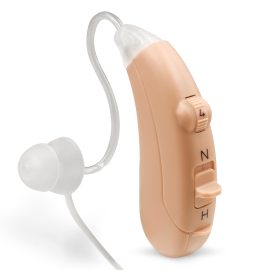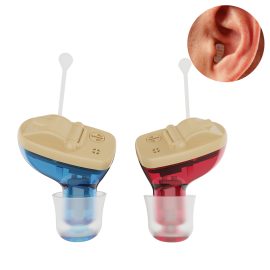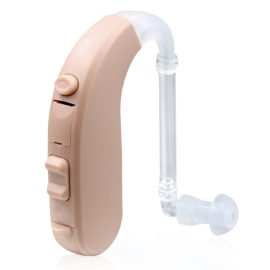Battery Hearing Aids
A battery-operated hearing aid, often referred to as a “battery hearing aid,” is a type of hearing device that relies on disposable or rechargeable batteries to power its operation. The advantages of battery-operated hearing aids include:
1. Portability: Battery-operated hearing aids are highly portable, allowing users to carry spare batteries with them for quick replacements when needed.
2. Availability: Disposable hearing aid batteries are widely available at pharmacies, electronics stores, and other retail outlets, making it convenient for users to purchase replacements.
3. Easy Maintenance: Replacing batteries is a simple and routine maintenance task for users. Most battery-operated hearing aids have a visible battery door, making it easy to access and change batteries.
4. Wide Range of Sizes: Hearing aid batteries come in various sizes (e.g., sizes 10, 312, 13, and 675), allowing users to choose the size that fits their specific hearing aid model.
5. Cost-Effectiveness: Disposable batteries are often more cost-effective than rechargeable alternatives, making them an economical choice for individuals on a budget.
6. No Charging Time: Unlike rechargeable hearing aids that require charging time, users can quickly replace disposable batteries to continue using their hearing aids without waiting for charging cycles.
7. Extended Battery Life: Disposable batteries, depending on the size and power consumption of the hearing aid, can provide extended usage before needing replacement.
8. Compatibility: Battery-operated hearing aids are available in various styles and models, making them compatible with a wide range of hearing loss profiles and preferences.
It’s important to note that while battery-operated hearing aids offer these advantages, they also have some drawbacks. Regularly purchasing and replacing disposable batteries can incur ongoing costs, and the environmental impact of disposable batteries can be a concern. Rechargeable hearing aids, on the other hand, offer the advantage of reduced environmental waste and long-term cost savings, but they may have a higher upfront cost. The choice between battery-operated and rechargeable hearing aids depends on individual preferences, lifestyle, and the specific needs of the user.



